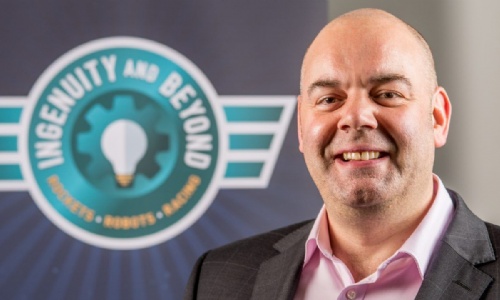Meet Siemens

We recently caught up with Richard Durham, who is Production, Projects and Quality Manager at Siemens Mechanical Drives in Leeds, a longstanding partner of UTC Leeds.
Siemens is a global engineering and advanced technologies company covering many exciting areas of development from automotive to construction and healthcare. We asked Richard about why Siemens has chosen to work with the UTC, what kinds of activities are happening and the impact that is having both on Siemens and the UTC students.
What does the Siemens factory at Leeds produce?
We basically make mechanical drives and mechanical solutions for industry. That might sound dry, but it means things like making gear boxes for wind turbines. Some of these items are huge – we can handle any application up to 25 tonnes in weight here in Leeds and our headquarter sites can make solutions as big as 150 tonnes, which is essentially the size of a small detached house!
Why has such a prestigious company as Siemens chosen to work with UTC Leeds?
It’s about the company’s commitment to investing in future talent. Our General Manager, Simon Nadin, was involved with the UTC from the outset, when it was first proposed. Simon is now a member of the UTC’s Academy Trust Board and is also a Governor. We are all passionate at Siemens about the UTC approach to developing future talent with the skills to succeed in today’s engineering and hi-tech industries.
Personally, I’ve been involved in some of the open evenings at the UTC and I’ve helped to create some of the workshops we run for the UTC students. I’ve also hosted some of the cohorts of students who visit our facility to look around.
Has Siemens offered any business challenges for UTC students?
Yes, we have offered a range of business challenges for the students to develop their technical and commercial skills. We look at problem-solving issues, so day-to-day problems that arise from production or from the office environment, which we ourselves don’t have the time to do. We give those challenges to the UTC students because, as we know, young people can be very entrepreneurial and quite often come up with fantastic solutions to what can appear to be obvious problems that aren’t so obvious in practice.
Can you give an example?
One of the problems the UTC students helped to solve for us is the supply of oil into our gear units. We were doing this in quite a basic way before, using a crane to suspend a barrel over a gear box, which was a bit inaccurate and if you got it wrong it could be messy. The students went away and came up with a solution, which we have actually implemented. We now meter the oil – so a bit like at the fuel station when you fill up your car with fuel, we now fill the gear box up with fuel from a large 1000 litre container. This has given us cost savings to the tune of £24,000 a year because of efficiencies and because we’re able to buy the oil at a better price.
How will working with the UTC benefit Siemens?
We don’t have enough engineers so if we can get involved at an earlier stage with young people at the UTC, giving students projects to work on, we can see how they fit our requirements and they can try out working at Siemens. Then, when it comes to recruiting apprentices or university students, we will have already identified those who fit with our approach and want to work with us. These UTC students are the future for businesses like ours.
Likewise, there are also benefits for the UTC students. We see them working round the factory applying what they’ve been learning at the UTC. They can see the actual application in the workplace, so it’s closing the gap between the text book and the reality of work.
What makes the UTC different?
Altogether, I think the UTC approach gives the students a more rounded experience and that essential work-readiness, so they get an appetite to come and work for companies like us. Academic qualifications matter but it’s life experience that will help you to set yourself apart from the other candidates as you progress into further study or work.

